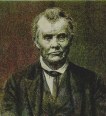|
|
 |
 |
|
Reading Guide |
| 6. |
Peter Cartwright, Autobiography: The Backwoods Preacher, 1856, excerpts
|
|
 |
We strongly recommend that you include this memoir in your syllabus, because it's all here—the lawless frontier, pioneer hardships, hostile Indians, the debate over slavery, churchless living, religious conversion, and evangelical camp meetings—all from the perspective of "backwoods preacher" Peter Cartwright. In the early 1790s, young Cartwright traveled with his family from Virginia through the "unbroken wilderness" to Kentucky. Living into his teens as a "wild, wicked boy," Cartwright at 16 experienced a religious conversion at the very time the Second Great Awakening was beginning in the revivals of Kentucky and Tennessee. He joined the Methodist Episcopal Church and at age 19 became a traveling preacher—exhorting at revivals, opposing ritual excesses like the "jerks," tackling doctrinal differences with Baptist preachers, and bemoaning the lackluster stance of his fellow Methodist ministers against slavery. A heartfelt, riveting memoir, and one to pair with the next text, Richard Allen's memoir as an African American preacher in the Methodist Church. Very useful in the classroom. 13 pages.
Discussion questions
| · |
How does frontier religion epitomize the new nation "living the revolution"? |
| · |
What would Cartwright value in the thinking of rationalists Adams and Jefferson? What would he reject? |
| · |
Compare Cartwright's and Allen's experiences as church members and circuit preachers. Where does race make the biggest differences? Where does place? |
| · |
What does Cartwright think his fellow ministers should do (and not do) to oppose slavery? How would Richard Allen or Venture Smith respond? |
| · |
Compare Cartwright's frontier experiences in the 1790s and early 1800s with those of Harriet Noble and Gideon Lincecum several decades later.
|
» Link |
 |
 |
Topic Framing Questions
| • |
How was religious freedom defined in the new republic? |
| • |
How did rationalists and evangelicals differ on the place of religion in a republic? How did they agree? |
| • |
How did diverse religious communities contribute to a shared national identity? |
| • |
How could church-state separation co-exist with the conviction that religion is critical to a nation's strength?
|
|
|
 |
 |
|
 |
